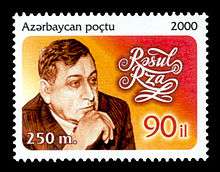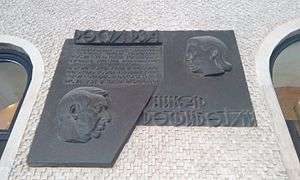Rasul Rza
| Rasul Rza | |
|---|---|
 House plate on a residence of Rza and Rafibeyli | |
| Born |
May 19, 1910 Goychay, Azerbaijan |
| Died |
April 1, 1981 (aged 70) Baku |
| Occupation | Writer |
| Children | Anar Rzayev |
Rasul Rza (real name Rasul Ibrahim oglu Rzayev – Azerbaijani: Rəsul Ibrahim oğlu Rzayev), (1910 – 1981 in Baku), was an Azerbaijani writer, Hero of Socialist Labour (1980), People's Poet of Azerbaijan, Laureate of Soviet State Award and the Chairman of the Writers' Union of Azerbaijan. He was the husband of Azerbaijani writer Nigar Rafibeyli and the father of writer Anar Rzayev.[1]
Life and writings

Rasul Rza was born Rasul Ibrahim oglu Rzayev on May 19, 1910 in Goychay. He studied in Transcaucasus Communist University, Azerbaijan Scientific Research Institute and Soviet Cinematography Institute. Rasul Rza was Chairman of Writers' Union of Azerbaijan in 1939, minister of Azerbaijani Cinematography (1945–48), chief editor of the Azerbaijani Soviet Encyclopedia (1966–75), member of board of directors of USSR Union of Writers (from 1964). With start of his career he adopted a shortened name Rasul Rza.
His first poem was called Bu gün (Today), published in Tbilisi. His serious multidimensional writings began in 30's. During the Great Patriotic War, he published many novels calling for patriotic spirit. He also wrote a poem about Lenin. In the 60's, he began writing in more philosophical tone relating his novels to intellectual source, analytical thinking, philosophical approach to daily life and so forth. The lyrical poems, dramas, proses he wrote hinted to sustained and subtle criticism of the Soviet regime, for which was banned to write for a period of time.[2] Additionally, he began composing songs to his poems.
He died in Baku on April 1, 1981 and was buried in Fakhri Khiyaban. A commemoration ceremony was held in his honor in [Ankara] in 2010.[3] The writers of Azerbaijan started a Rasul Rza Foundation and present awards to successful writers. It is chaired by Fikrat Goja.[4]
References
- ↑ "Reminscences of Uzeyir Hajibeyov". Retrieved July 17, 2010.
- ↑ Aesopian literary dimensions of Azerbaijani literature of the Soviet period. Maliheh S. Tyrrell, page 47
- ↑ "Azerbaijani people's poet Rasul Rza commemorated in Ankara". Today. Retrieved July 21, 2010.
- ↑ "Ceremony of presenting International Rasul Rza award held in Azerbaijan Writers' Union". APA. Retrieved July 21, 2010.